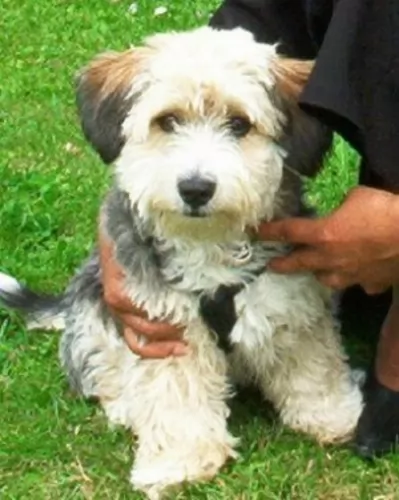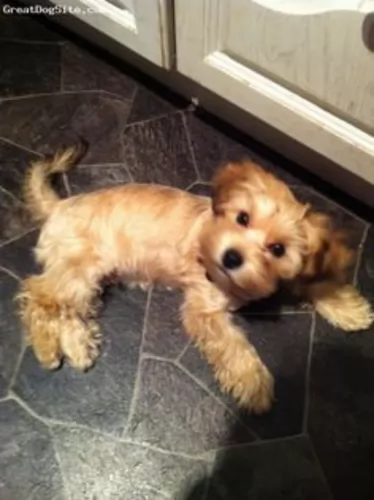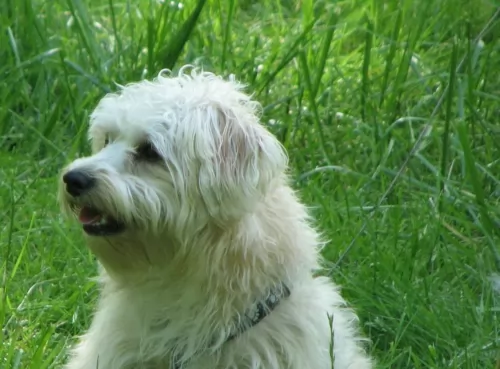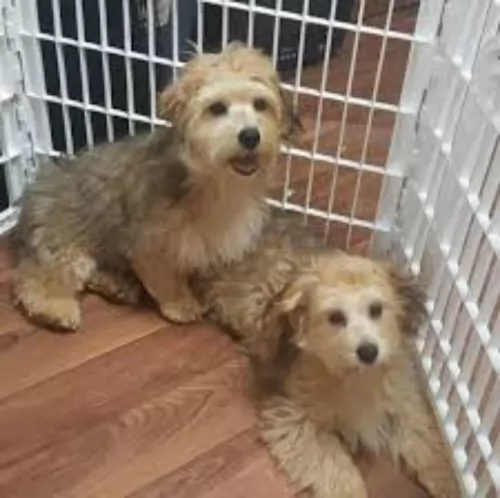 Petzlover
PetzloverBoth Canadian Pointer and Yo-Chon are originated from United States. Canadian Pointer may grow 46 cm / 19 inches higher than Yo-Chon. Canadian Pointer may weigh 23 kg / 51 pounds more than Yo-Chon. Both Canadian Pointer and Yo-Chon has same life span. Both Canadian Pointer and Yo-Chon has almost same litter size. Canadian Pointer requires Low Maintenance. But Yo-Chon requires Moderate Maintenance
There are some dog breeds whose history and origins are dubious. The existence of the Canadian Pointer is also a matter of debate, and research reveals very scanty information.
The dog seems to have been a gundog which originated in the United States. Another name for the dog is Adirondak Pointing Dog. The Canadian Pointer was developed from English Pointers, Labrador Retrievers and Portuguese Pointers during the 19th century. He was used for hunting and retrieving prey such as birds and rabbits.
 The Yorkie Bichon or Yo-Chon as he is fondly referred to as a designer crossbreed hailing from the United States.
The Yorkie Bichon or Yo-Chon as he is fondly referred to as a designer crossbreed hailing from the United States.
Information isn’t readily available on the origins of this cute little dog, but the dog is believed to be a cross between a Bichon Frise and Yorkshire Terrier.
It is thought that the dog was developed in the United States from about 1998 to 2001. As a hybrid, the Yorkie Bichon isn’t recognized by the American Kennel Club.
The Canadian Pointer makes for an excellent family pet. He is intelligent, excitable, loving and devoted, forming a strong bond with his human family. Active and excitable, it is this very energetic characteristic which will require him needing training and socialization. He is inclined to want to jump up against his family at the sheer joy of seeing them.
Although he loves country life, his love of human companionship allows him to adapt to city life and he is non-aggressive and can be a placid pet with children and other pets in the home.
The Canadian Pointer is a medium- to large sized breed of gundog. He has a lean, well muscled body with a short, coarse coat. The coat can be dark brown and white, black and white or a fawn color and white. The coat can also be freckled in parts.
He is a gundog belonging to the HPR group. HPR stands for hunting, pointing and retrieving. Weighing roughly 22–27kg, he stands about 56 – 76cm in height. Sometimes the tail is docked but otherwise it is left so that it’s medium length and is held straight out and level with the body. The ears of the Canadian Pointer are fairly short and floppy.
 The Yo-Chon stands between 25 and 30cm and weighs in the region of 2 to 4kg. He can be like a teddy-bear this little dog and the coat can be either silky and straight or wavy. It is medium length and some people have the coat professionally trimmed.
The Yo-Chon stands between 25 and 30cm and weighs in the region of 2 to 4kg. He can be like a teddy-bear this little dog and the coat can be either silky and straight or wavy. It is medium length and some people have the coat professionally trimmed.
The low shedding coat comes in a variety of colors – cream, grey, tan, white, black or bi-colored.
Your Yorkie Bichon will no doubt have some habits that come from both parent breeds. Your dog is likely to be independent, social, friendly, social and loving, wanting to spend lots of time with you.
They’re small but they make good watchdogs with their high-pitch bark. Your Yo-Chon is an intelligent little dog too and by having him trained and socialized he is well behaved and pleasant to have around. You can tell him to lie down, sit or stay which is useful when you have visitors.
He gets on well with children, but the puppies particularly are tiny and fragile and they can easily get hurt by untrained and undisciplined children.
The Canadian Pointer is a dog who thrives on hard work and they are strong-willed, confident and boisterous but never aggressive. They’re intelligent and alert and respond well to training and socialization. Once trained he works hard to please his owner.
The Canadian Pointer is independent and can be aloof around strangers, but he just loves his human family and makes every effort to please them and be around them whenever he can. Treat him properly and he will give you endless hours of enjoyment and companionship.
 The Yo-Chon is an independent, happy dog who loves nothing more than to be surrounded by all his favorite human beings.
The Yo-Chon is an independent, happy dog who loves nothing more than to be surrounded by all his favorite human beings.
They are loving, loyal and gentle dogs and are good playmates for children who have been taught how to handle them with care and kindness.
He is smart and has an amicable nature and will take kindly to being trained and socialized.
With the Yo-Chon in your life, you can be sure you’re going to benefit from having a splendid family pet and companion.
Pointer dogs are looked upon as a healthy breed, but having said that, they aren’t immune to illness, and there are some common dog diseases that you should be aware of -
This disease is caused by a malformation of the hip joint. This ailment can result in pain and discomfort for your pet as well as arthritis and even lameness. Unfortunately there is no cure but the vet can do a lot to make life more comfortable for your pet.
This is a genetic eye disease where your pet gradually loses vision. The retina deteriorates and stops functioning.
 Both the Yorkie and Bichon Frise are dog breeds that are prone to Legg-Calvé-Perthes disease. This is when there is insufficient blood supply to the hind thigh bone, so the dog becomes lame.
Both the Yorkie and Bichon Frise are dog breeds that are prone to Legg-Calvé-Perthes disease. This is when there is insufficient blood supply to the hind thigh bone, so the dog becomes lame.
Surgical correction is necessary. Like small dogs in general, the Yochon might have dental issues. Slipped kneecaps, hypothyroidism and eye problems might affect the Yochon as well.
The Canadian Pointer was specifically developed to be a hunter so he is an energetic dog. When it comes to caring for him, training and socialization can make him an even more amicable pet. He is muscled and lithe and you want to keep him that way by ensuring he is well exercised.
Take him on walks, into the park with ball and frisbee or let him run while you cycle. Don’t leave him without exercise as he can become frustrated and ill.
The Canadian Pointer is a low maintenance breed with his short coat. You’ll need to give his coat a good brushing twice a week to rid him of loose hairs to keep the hair shiny and healthy.
Dogs like the Canadian Pointer with floppy ears will need to have their ears checked for infections to avoid hearing loss. You’ll see your dog shake his head, the inside of his ears may be red and he could have a moist discharge.
Remember that yeast and bacteria are problems with floppy-eared dog breeds and you’ll need to ensure that the ears are cleaned and kept dry. Be careful if you don’t know how to do it, and get advice from your veterinarian on how to attend to the ears of your dog.
 Everybody is busy and they don’t always have time to exercise their pets. As a human being, your health relies heavily on the exercise you get so you and your dog can exercise together.
Everybody is busy and they don’t always have time to exercise their pets. As a human being, your health relies heavily on the exercise you get so you and your dog can exercise together.
These days if you seriously don’t have time and you have money to spare, there are excellent doggy daycare centers where your dog can have fun playtimes with other dogs and people.
Dog exercises will change over time with age but at least try to get used to giving your pet a walk every day as this kind of exercise can extend into old age with both you and your pet.
Swimming, ball games, fetch games and walks or hikes are all great forms of exercise.
Good nutrition ensures your Yorkie Bichon has a good chance to be healthy and energetic. Some of the commercially manufactured dog foods you get are made with bad ingredients and they can make your dog sick.
The good quality ones can be nutritious for your dog and also wonderfully convenient. Always read the packaging labels so you know what your dog’s getting.
Cooked vegetables, boiled chicken and brown rice, nicely chopped up and added to the dry kibble can add variety to your pet’s diet while remaining deliciously nutritious and tasty as well.
Brush your Yo-Chon at least twice a week to keep the hair silky and shiny. Clip your dog’s nails when they get long.
Check inside his ears for signs of redness and the possibility of an infection. Try and look inside his mouth too for bad teeth as this can cause lots of health problems for your pet.
If you don’t have the time to do all these things, there are professional pet groomers who will do all these grooming chores for you.